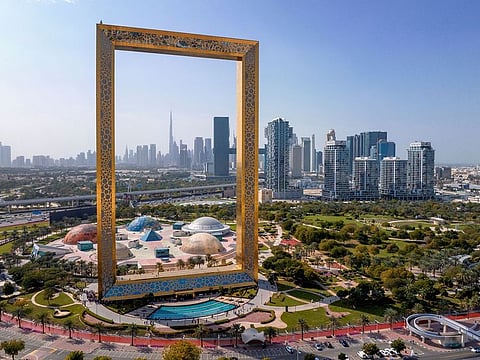UAE targets Dh450 billion worth of investments in hotel industry over 7 years: Al Marri
Tourism projected to account for 16% of UAE GDP by 2031: Al Marri

Dubai: The UAE is setting its sights high for the hospitality and tourism sector, projecting it will account for 16 per cent of the nation’s GDP by 2031, a significant rise from 11.7 per cent in 2023, equating to Dh 220 billion.
To realise these ambitious goals, the country plans to secure over Dh 450 billion in investments within the hotel industry over the next seven years. This strategy includes diversifying offerings by making substantial inroads into wellness and medical tourism and enhancing tourism initiatives in the Northern Emirates, including Sharjah, Fujairah, Ajman, and RAK.
Abdulla bin Touq Al Marri, UAE Minister of Economy, outlined these targets at the Future Hospitality Summit in Dubai and said that the UAE is on track to achieve them.
“In the first half of this year, about 73 million visitors were managed by our airports in the UAE. We have over 1,200 hotels that have hosted millions of people, and our occupancy levels are at 80 per cent, which is among the highest in the world,” said Al Marri.
The Minister said the UAE’s appeal as a major tourism hub lies in the safety of offers despite tensions in the broader Middle East. “We are in the eye of the storm, but we have the highest safety and security protocols. And everyone knows that about us. Our numbers speak for themselves,” he said.
According to the World Travel and Tourism Council (WTTC), the UAE’s travel and tourism industry grew by 26 per cent last year, contributing Dh220 billion to the country’s GDP.
Boosting supplies to meet targets
On the supply side, the UAE aims to attract over Dh450 billion in hotel industry investments over the next seven years. “We are focused on significantly increasing the number of hotel keys and expanding our hospitality offerings,” said Al Marri.
The UAE also wants to diversify its tourism portfolio by emphasising medical and wellness tourism. A key objective is to boost the average length of stay for visitors, currently at 3.5 to 3.6 nights, to between 7 and 8 nights per visit. The Minister said he is also seeking ways to introduce new types of products into UAE’s Northern Emirates. “Each Emirate, from Fujairah to Abu Dhabi, has a different competitive advantage to offer. It can be so that tourists can start their journey with breakfast in Fujairah, and move on to having lunch in Dubai,” he said.
Competition from Saudi Arabia
When asked if Saudi Arabia’s rapidly growing tourism sector challenges UAE’s hospitality sector, “Not at all; UAE has a 60 per cent international and a 40 per cent domestic tourism (consisting of UAE nationals and expatriates) - split. We’ve focused on domestic tourism with campaigns like ‘The Coolest Winter in the World,’ which has run for four consecutive years. We are going to launch another one this year.”
He added, “We realised a huge demand for offerings among domestic tourists. Domestic tourism is crucial because it is high-spending, and we are working to balance international and domestic tourism at 50-50.”
Domestic tourists
Al-Marri cited the example of Fujairah’s Dibba Bay Oysters, which exports French oysters to different parts of the world. “This is a domestic tourism aspect that comes in, and we want to double down on offerings such as these. I want to focus on domestic tourism because pre-Covid, we were 70 per cent international and 30 per cent domestic. And when Covid hit, it reversed to 30-70. That’s when we adapted many of our offerings to benefit local tourists,” said Al Marri.
Increasing the workforce
The tourism industry in the UAE employs around 800,000 people, about 12 per cent of the workforce, said the Minister. “We are collaborating with the Nafis program and other initiatives to encourage more UAE nationals to join the tourism sector, offering salary incentives and pension plans,” he said.
“Globally, the tourism industry faces challenges in attracting talent, and we’re addressing this by working with the UN on education toolkits to make the industry more appealing,” said the Minister.
Sign up for the Daily Briefing
Get the latest news and updates straight to your inbox


